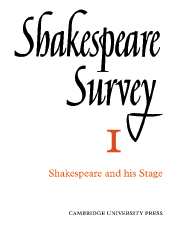Book contents
- Frontmatter
- Studies in the Elizabethan Stage since 1900
- Titus Andronicus on the Stage in 1595
- A Note on the Swan Theatre Drawing
- The Bankside Theatres: Early Engravings
- Shakespeare and the Blackfriars Theatre
- Shakespeare’s Bad Poetry
- The Folger Shakespeare Library
- The Heritage of Shakespeare’s Birthplace
- Three Shakespearian Productions: A Conversation
- Four Lears
- London Productions
- Stratford Productions
- International News
- The Year's Contributions to Shakespearian Study 1 Critical Studies
- 2 Shakespeare’s Life and Times
- 3 Textual Studies
- Books Received
- Index
- Plate section
Shakespeare and the Blackfriars Theatre
Published online by Cambridge University Press: 28 March 2007
- Frontmatter
- Studies in the Elizabethan Stage since 1900
- Titus Andronicus on the Stage in 1595
- A Note on the Swan Theatre Drawing
- The Bankside Theatres: Early Engravings
- Shakespeare and the Blackfriars Theatre
- Shakespeare’s Bad Poetry
- The Folger Shakespeare Library
- The Heritage of Shakespeare’s Birthplace
- Three Shakespearian Productions: A Conversation
- Four Lears
- London Productions
- Stratford Productions
- International News
- The Year's Contributions to Shakespearian Study 1 Critical Studies
- 2 Shakespeare’s Life and Times
- 3 Textual Studies
- Books Received
- Index
- Plate section
Summary
It is necessary at the outset in a discussion of this sort to place Shakespeare in what seems to me his proper context—a context which none but the Baconians and Oxfordians deny, but which most scholars and critics tend to ignore. That context is the London commercial theatre and the organized professional acting troupe.
Shakespeare was more completely and continuously involved with theatres and acting companies than any other Elizabethan dramatist whose life we know. Most Elizabethan dramatists had only their writing connection with the theatres, but Shakespeare belonged to the small group which both wrote and acted. In this small group of actor-dramatists, the best-known names are those of Heywood, Rowley, Field and Shakespeare. Of this thoroughly professionalized band, Shakespeare is the one most closely bound to his company and his theatre, for he is the only one of the four who did not shift about from company to company but maintained his close association with a single acting troupe for more than twenty years. Besides this, he was bound to theatres and actors in still another fashion which makes him unique among all Elizabethan dramatists: he is the only dramatist we know who owned stock in theatre buildings over an extended period. His income was derived from acting, from writing plays, from shares in dramatic enterprises, and from theatre rents. From the beginning to the end of his writing career we must see him in a theatrical context if we are not to do violence to the recorded facts. At the beginning is our first reference to him in Greene's allusion to the “Tygers hart wrapt in a Players hyde”; at the end are his own last words, so far as we know them, in his will. This will is mostly concerned with Stratford affairs, but when he does turn to the years of his London life and his many London associates, he singles out only three for a last remembrance. These men are John Heminges, Henry Condell, and Richard Burbage—all three actors, all three fellow-sharers in the acting company of the King's men, all three fellow-stockholders in the Globe and the Blackfriars. If Shakespeare's proper context is not the London commercial theatres and the professional troupes, then evidence has no meaning, and one man's irresponsible fancies are as good as another's.
- Type
- Chapter
- Information
- Shakespeare Survey , pp. 38 - 50Publisher: Cambridge University PressPrint publication year: 1948
- 4
- Cited by

